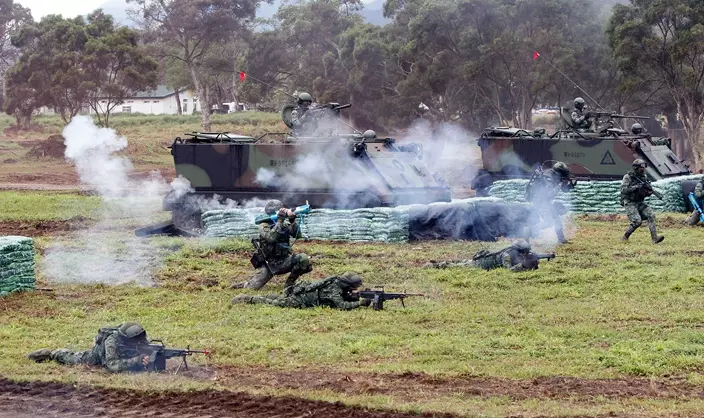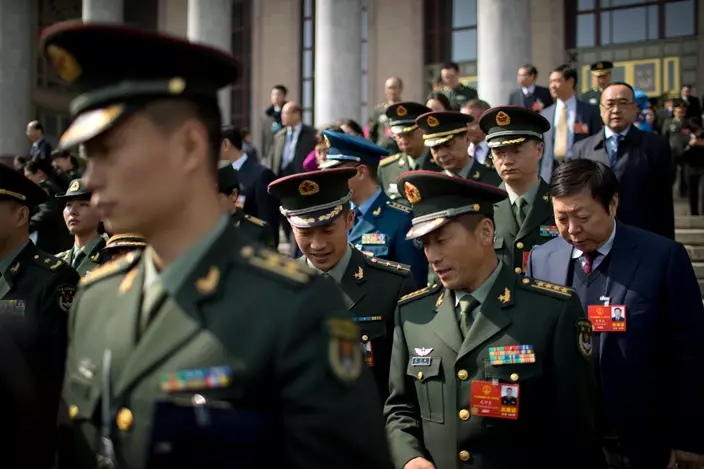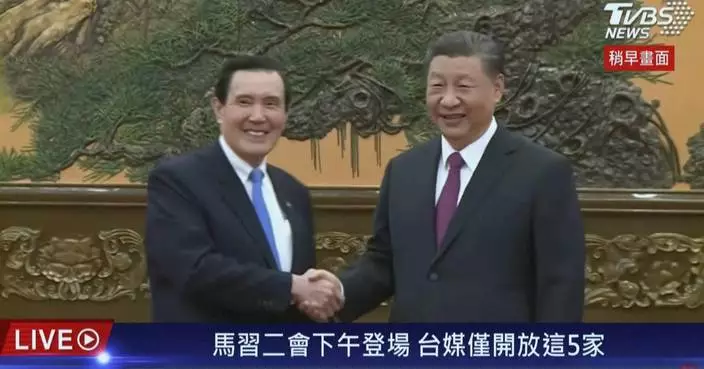Taiwan will look to its domestic arms industry as well as foreign suppliers to respond to China's continuing military buildup, but has no interest in engaging in an arms race with its cross-strait rival, the defense ministry said Tuesday.

FILE - In this Jan. 30, 2018, file photo, Taiwanese soldiers move during a military exercises to show its determination to defend itself from Chinese threats, in Hualien County, eastern Taiwan. (AP Photo/Chiang Ying-ying, File)
The remarks from spokesman Chen Chung-ji came a day after China announced an 8.1 percent rise in its military budget for this year to 1.1 trillion yuan ($173 billion), the world's second largest after the United States.
"Taiwan has no intention of getting involved in an arms race with China, or with neighboring countries," Chen told reporters at a briefing. "However, we expect to strengthen our capabilities in self-developing arms, including locally built vessels and aircraft, or even information and communication warfare."
China regards Taiwan as Chinese territory to be eventually brought under its control, by force if necessary.
Under China-imposed diplomatic isolation, Taiwan has few avenues for purchasing arms abroad apart from the United States, which despite only having unofficial ties with the self-governing island democracy, is legally bound to ensure it has a credible defense.

FILE - In this Monday, March 5, 2018, file photo, military delegates leave after the opening session of China's National People's Congress (NPC) at the Great Hall of the People in Beijing. (AP Photo/Mark Schiefelbein, File)
Under President Tsai Ing-wen, Taiwan has also sought to reinvigorate its domestic arms industry including in building trainer aircraft and possibly ships and submarines.
Such foreign and domestic weapon systems aimed to "satisfy the needs of defensive warfare, and assure the security of Taiwan, as well as to maintain regional stability and peace," Chen said.
With the world's largest standing military of between 2 million and 2.3 million members, China is preparing to launch its second aircraft carrier while integrating stealth fighters into its air force and fielding an array of advanced missiles able to attack air and sea targets at vast distances.
Taiwan's armed forces are far smaller, although the island has universal conscription and a pool of reserves nearly 3 million strong. Its commanders have sought to capitalize on the physical barrier posed by the 160-kilometer (100-mile) -wide Taiwan Strait to fend off a possible Chinese attack.
As part of a pressure campaign against Tsai, China has sent bombers and fighter planes to fly around Taiwan and sailed its sole operating aircraft carrier through the strait with its battle group. China's missile arsenal is also considered a key component in any assault, able to overwhelm Taiwan's air defenses by sheer force of numbers.
WASHINGTON (AP) — House congressional leaders were toiling Thursday on a delicate, bipartisan push toward weekend votes to approve a $95 billion package of foreign aid for Ukraine, Israel and Taiwan, as well as several other national security policies at a critical moment at home and abroad.
Republican House Speaker Mike Johnson this week set in motion a plan to advance the package, which has been held up since October by GOP lawmakers resistant to approving more funding for Ukraine's fight against Russia. As the Republican speaker faced an outright rebellion from his right flank and growing threats for his ouster, it became clear that House Democrat Leader Hakeem Jeffries would have to lend help to Johnson every step of the way.
“This is a very important message we are going to send to the world this week, and I'm anxious to get it done,” Johnson said earlier Wednesday announcing his strategy.
The growing momentum for a bipartisanship dynamic, a rarity in the deeply divided Congress, brought rare scenes of Republicans and Democrats working together to assert U.S. standing on the global stage and help American allies. But it also sent Johnson's House Republican majority into fresh rounds of chaos.
Johnson's Republican leadership team, seizing on the opportunity to outflank hardline conservatives with Democratic support, raised the idea of quickly changing the procedural rules to make it harder to oust the speaker from office.
But ultra-conservatives reacted with fury, angrily confronting Johnson on the House floor in a tense scene on Thursday morning. Several suggested they would join the effort to oust Johnson if the rule was changed. By the afternoon, Johnson backed away from the idea.
“We will continue to govern under the existing rules,” the speaker said on the social platform X.
Meanwhile, a rare image of bipartisan statesmanship was on display as the procedural Rules committee began debate launching the steps needed to push the foreign aid package forward toward weekend voting.
The Republican chairmen of the powerful Appropriations and Foreign Affairs committees alongside their top Democratic counterparts spoke in evocative language, some drawing on World War II history, to make the case for ensuring the U.S. stand with its allies against aggressors.
Chairman Michael McCaul of the Foreign Affairs Committee cast this as a “pivotal” time in world history, comparing the current images of people fleeing the conflict in Europe to the situation in 1939 as Hitler's Germany rose to power.
“Time is not on our side,” he told the panel.
The top Democrat on the Foreign Affairs Committee, Rep. Greg Meeks of New York, shared McCaul’s urgency: “The camera of history is rolling.”
Johnson is trying to advance a complex plan to hold individual votes this weekend on the funds for Ukraine, Israel and allies in the Asia-Pacific, then stitch the package back together.
The package would also include legislation that allows the U.S. to seize frozen Russian central bank assets to rebuild Ukraine; impose sanctions on Iran, Russia, China and criminal organizations that traffic fentanyl; and potentially ban the video app TikTok if its China-based owner doesn’t sell its stake within a year.
President Joe Biden is emphatically pushing Congress to pass the legislation to buttress what has been a cornerstone of his foreign policy — halting Russian President Vladimir Putin’s advance in Europe.
“With the boost from supplemental assistance, Ukrainians are entirely capable of holding their own through 2024, and puncturing Putin’s arrogant view that time is on his side,” CIA Director Bill Burns told an audience at the Bush Center in Dallas Thursday.
While Johnson is trying to remain close to Trump, and positioning the national security package as a way to assert U.S. strength in the world in the mold of Ronald Reagan-era Republicans, that puts the speaker politically at odds with the anti-interventionists powering the former president's bid to return to the White House.
“Why isn’t Europe giving more money to help Ukraine?” Trump wrote on social media, but his post did not explicitly oppose the foreign aid package before Congress.
At the Capitol, the ultraconservative House Freedom Caucus was urging Republicans to block the package from advancing to a final vote. The group demanded that sweeping immigration enforcement be added to the bill and derided it as the “‘America Last’ foreign wars supplemental package.”
Given the high stakes of the moment for Ukraine, Israel and other allies, and the inability of Johnson to marshal enough Republican support, the speaker had no other choice but to rely on Democrats if he intends to see the national security package to passage.
Late Thursday night, the four Democrats on the Rules committee voted for a procedural move to advance the bill to the House floor, while three archconservative Republicans voted against it.
Rarely, if ever, does the minority party help the majority through the procedural hoops, particularly in the House Rules committee or during the various floor votes before final passage. It represented a level of bipartisanship unseen in this Congress, even as Republican leaders watched their own priority bills defeated on procedural votes by their own members.
“This is a moment in history where we need to ensure that at long last we are bringing this critical aid to Ukraine to the floor,” Democratic Whip Rep. Katherine Clark told reporters earlier Thursday.
Yet Democrats were also trying to apply maximum leverage as Johnson's job comes under threat.
At a closed door Democratic meeting, Clark advised rank and file lawmakers not to divulge their positions on whether they would vote to help defeat a motion to vacate Johnson as speaker, though a handful of Democrats have already publicly said they would likely do so.
“Do not box yourself in with a public statement," Clark told them according to a person familiar with the remarks.
Lawmakers say the world is watching and waiting on its next steps, but there's still a long slog ahead. If the House is able to clear the package this weekend, it still must go to the Senate for another round of voting.
Sen. Rand Paul, a Republican of Kentucky who is adamantly opposed to the aid package, said on X that “no one should expect easy or quick passage in the Senate.”
Associated Press writer Ellen Knickmeyer in Washington contributed.

Ukraine's Prime Minister Denys Shmyhal, left, is welcomed by Senate Majority Leader Chuck Schumer, D-N.Y., as Congress moves to advance an emergency aid package for Israel, Ukraine and Taiwan, at the Capitol in Washington, Thursday, April 18, 2024. (AP Photo/J. Scott Applewhite)

Rep. Chip Roy, R-Texas, joined at left by Rep. Ralph Norman, R-S.C., argues a point as the House Rules Committee prepares an emergency foreign aid package for Israel, Ukraine and Taiwan, at the U.S. Capitol in Washington, Thursday, April 18, 2024. (AP Photo/J. Scott Applewhite)

House Appropriations Chairman Tom Cole, R-Okla., appears before the House Rules Committee as they prepare an emergency foreign aid package for Israel, Ukraine and Taiwan, at the U.S. Capitol in Washington, Thursday, April 18, 2024. (AP Photo/J. Scott Applewhite)

Speaker of the House Mike Johnson, R-La., and the House Republican leadership meet with reporters following a closed-door Republican strategy session as Johnson pushes towards separate votes on aid for Israel and Ukraine, at the Capitol in Washington, Tuesday, April 16, 2024. (AP Photo/J. Scott Applewhite)













